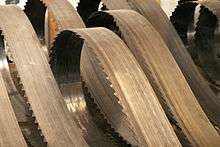blade
See also: Blade
English

Band saw blades
Etymology
From Middle English blade, blad, from Old English blæd (“leaf”), from Proto-Germanic *bladą (compare West Frisian bled, Dutch blad, German Blatt, Danish blad) from Proto-Indo-European *bʰlh̥₃oto (compare Irish bláth (“flower”), Tocharian A pält, Tocharian B pilta (“leaf”), Albanian fletë (“leaf”)), from *bʰleh₃- (“to thrive, bloom”). Similar usage in Sägeblatt (“saw leaf”), the German term for a saw blade. More at blow.
Pronunciation
- enPR: blād, IPA(key): /bleɪd/
Audio (US) (file) - Rhymes: -eɪd
Noun

Knife blades
blade (plural blades)
- The sharp cutting edge of a knife, chisel, or other tool, a razor blade/sword.
- The flat functional end of a propeller, oar, hockey stick, screwdriver, skate, etc.
- 2013 July-August, Lee S. Langston, “The Adaptable Gas Turbine”, in American Scientist:
- Turbines have been around for a long time—windmills and water wheels are early examples. The name comes from the Latin turbo, meaning vortex, and thus the defining property of a turbine is that a fluid or gas turns the blades of a rotor, which is attached to a shaft that can perform useful work.
-
- The narrow leaf of a grass or cereal.
- (botany) The thin, flat part of a plant leaf, attached to a stem (petiole). The lamina.
- A flat bone, especially the shoulder blade.
- A cut of beef from near the shoulder blade (part of the chuck).
- The flat part of the tongue.
- (poetic) A sword or knife.
- (archaeology) A piece of prepared, sharp-edged stone, often flint, at least twice as long as it is wide; a long flake of ground-edge stone or knapped vitreous stone.
- (ultimate frisbee) A throw characterized by a tight parabolic trajectory due to a steep lateral attitude.
- (sailing) The rudder, daggerboard, or centerboard of a vessel.
- A bulldozer or surface-grading machine with mechanically adjustable blade that is nominally perpendicular to the forward motion of the vehicle.
- (dated) A dashing young man.
- Coleridge
- He saw a turnkey in a trice / Fetter a troublesome blade.
- Coleridge
- (slang, chiefly US) A homosexual, usually male.
- Thin plate, foil.
- (photography) One of a series of small plates that make up the aperture or the shutter of a camera.
- (architecture, in the plural) The principal rafters of a roof.
- (Can we find and add a quotation of Weale to this entry?)
- The four large shell plates on the sides, and the five large ones of the middle, of the carapace of the sea turtle, which yield the best tortoise shell.
- (Can we find and add a quotation of De Colange to this entry?)
- Airfoil in windmills and windturbines.
- (computing) A blade server.
Derived terms
terms derived from blade (noun)
Translations
sharp-edged or pointed working end of a tool or utensil
|
|
thin plate, foil
the flat part of a leaf or petal
slang term for a weapon such as a dagger
flat outer part of an oar
part of a propeller
one of a series of small plates that make up the aperture or the shutter of a camera
|
airfoil in windmills and windturbines
- The translations below need to be checked and inserted above into the appropriate translation tables, removing any numbers. Numbers do not necessarily match those in definitions. See instructions at Wiktionary:Entry layout#Translations.
Translations to be checked
|
|
References
Verb
blade (third-person singular simple present blades, present participle blading, simple past and past participle bladed)
- (informal) To skate on rollerblades.
- (transitive) To furnish with a blade.
- (intransitive, poetic) To put forth or have a blade.
- P. Fletcher
- As sweet a plant, as fair a flower, is faded / As ever in the Muses' garden bladed.
- P. Fletcher
- (transitive, professional wrestling, slang) To cut (a person) so as to provoke bleeding.
Derived terms
- hydroblade
Translations
(informal) to skate on rollerblades
Middle English
Etymology
From Old English blæd, from Proto-Germanic *bladą, from Proto-Indo-European *bʰl̥h₃otom.
Pronunciation
- IPA(key): /blaːd/, /blad/
Noun
blade (plural blades or bladdys)
- A leaf or blade; a piece foliage in general.
- A blade (sharp edge of a weapon).
- Any sharp-bladed slashing or stabbing weapon.
- (rare) A wooden tile or chip for roofing.
- (rare) Anything close in appearance or form to a blade.
References
- “blā̆d(e (n.)” in MED Online, Ann Arbor, Mich.: University of Michigan, 2007, retrieved 2018-06-29.
Polish
Pronunciation
- IPA(key): /ˈbla.dɛ/
Adjective
blade
- inflection of blady:
- neuter nominative singular
- neuter accusative singular
- neuter vocative singular
- nonvirile nominative plural
- nonvirile accusative plural
- nonvirile vocative plural
This article is issued from
Wiktionary.
The text is licensed under Creative
Commons - Attribution - Sharealike.
Additional terms may apply for the media files.